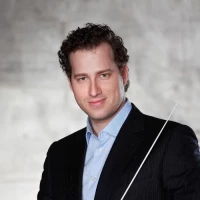Join us for The Philadelphia Orchestra on Sunday, Dec. 28 at 1 p.m. on WRTI 90.1 and Monday, Dec. 29 at 7 p.m. on WRTI HD-2 as Danish violinist and conductor Nikolaj Szeps-Znaider does double duty. This performance marks his conducting debut with the Philadelphians, a quarter century after his solo debut here.
Ludwig van Beethoven’s expansive Violin Concerto in D Major opens the program. In Beethoven’s time, violin concertos were, for the most part, sheer entertainment — an occasion for showmanship on the part of the soloist, whose technical expertise would typically be on full display. Audiences were captivated by virtuosic fast passages, athletic leaps, complicated trills, and the like. So when Beethoven produced his Violin Concerto in 1806, everyone was a bit flummoxed by its symphonic scope. Its lyricism was much admired, but even erudite critics sounded a word of caution. “It is feared that if Beethoven continues to follow his present course,” one wrote, “the music could soon fail to please anyone not familiar with the rules and difficulties of the art” — by which he meant the art of composition.
And the reviewer wasn’t exactly wrong. Beethoven’s works over the next 20 years did often confuse his contemporaries. On the other hand, the composer’s forward-looking vision is undoubtedly why works such as this Violin Concerto remain at the center of the orchestral repertoire, more than two centuries later. By contrast, it’s hard to think of a household-name concerto by any of Beethoven’s contemporaries. Their impressive virtuoso passages soon wore thin. “What Beethoven was able to touch is, for me, miraculous,” comments Szeps-Znaider. The composer’s Violin Concerto “illustrates almost better than anything, human striving for excellence, human striving for the divine. That’s what the great masterpieces do. They show humanity from its absolutely best side.”

Similarly, Szeps-Znaider says that Antonín Dvořák’s Symphony No. 7 “holds a special place in my heart.” Dvořák, the conductor notes, “reaches a depth…where you feel that the music expresses an ideal state.” This majestic symphony dates from the mid-1880s, just after Dvořák heard the premiere of the Symphony No. 3 by his mentor, Johannes Brahms. While composing, he held the Brahms Third up as a kind of North Star, an inspiration and lofty standard he was determined to meet in his own Seventh.
At this time Dvořák was enjoying runaway successes in England. He made several successful visits there, each of which further burnished his international reputation. It all began when his choral setting of the Stabat Mater created a sensation in London in 1883. Commissions followed for new large choral works from various British festivals, and his Sixth Symphony met with huge acclaim. The orchestra that performed it, the Royal Philharmonic, promptly made Dvořák an honorary fellow and commissioned a new symphony for the following season. This would be the Seventh. When he led the premiere in London in 1885, he scored yet another huge British success. And no wonder. The Seventh Symphony is a work of grandeur, brilliant orchestral color, irresistible melodies, and high drama — all in perfect balance.
PROGRAM:
Beethoven: Violin Concerto in D Major, Op. 61
Dvořák: Symphony No. 7 in D Minor, Op. 70
The Philadelphia Orchestra
Nikolaj Szeps-Znaider, violin and conductor
WRTI PRODUCTION TEAM:
Melinda Whiting: Host
Alex Ariff: Senior Producer and Broadcast Engineer
Listen to The Philadelphia Orchestra in Concert broadcasts every Sunday at 1 p.m. on WRTI 90.1, streaming at WRTI.org, on the WRTI mobile app, and on your smart speaker. Listen again on Mondays at 7 p.m. on WRTI HD-2. Listen for up to two weeks after broadcast on WRTI Replay, accessible from the WRTI homepage (look for Listen to The Philadelphia Orchestra in Concert On Demand).


